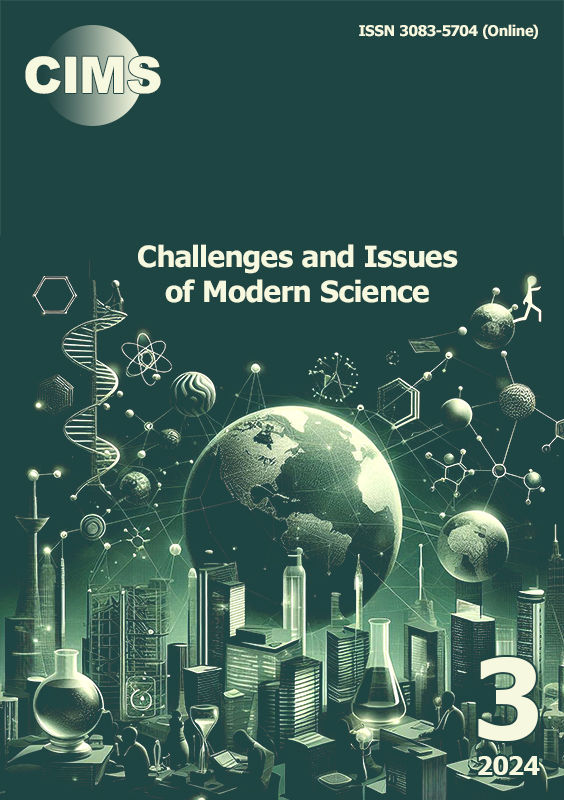Emotional intelligence as a factor in successful team management
Keywords:
emotional intelligence, team management, development, leader, team members, management decisionsAbstract
Purpose. The purpose of this study is to explore the role of emotional intelligence (EI) in enhancing team management effectiveness. Specifically, how EI contributes to team dynamics, communication, conflict resolution, and overall team performance. Design / Method / Approach. While writing the work, the materials of the work of leading scientists were studied. The research employed a mixed-methods approach, combining qualitative and quantitative data collection methods. Findings. The findings indicate a strong positive correlation between high levels of emotional intelligence in team leaders and improved team performance metrics, including productivity, collaboration, and job satisfaction. Qualitative data revealed that leaders with high EI were more adept at recognizing team members' emotions, fostering open communication, and motivating their teams. Theoretical Implications. This research contributes to the existing body of literature on emotional intelligence. It supports the theoretical framework that suggests EI is a critical competency for effective leadership and team dynamics, extending the understanding of how emotional intelligence impacts organizational behavior. Practical Implications. The findings highlight the importance of incorporating emotional intelligence training into leadership development programs. Organizations should prioritize EI in their hiring processes for team leaders and provide training to enhance emotional competencies. Fostering a culture that values emotional awareness can lead to more cohesive and high-performing teams. Originality / Value. This study adds value by bridging the gap between emotional intelligence theory and practical team management applications. It emphasizes the necessity of EI in leadership roles and provides actionable insights for organizations seeking to improve team dynamics and performance. Research Limitations / Future Research. Future research could explore longitudinal studies to assess the long-term effects of emotional intelligence on team management and investigate the role of EI in diverse cultural contexts. Paper Type. Practitioner Paper.
Downloads
References
Гайдукевич, К., & Поліщук, Л. (2023). Емоційний інтелект як важлива складова успіху в професійній діяльності івент-менеджера. Питання культурології, (41), 78-88. https://doi.org/10.31866/2410-1311.41.2023.276695
Голобородько, Т. В., & Буркова, Л. А. (2023). Етичні аспекти лідерства в управлінській практиці: роль інформаційного забезпечення та менеджменту персоналу в умовах розвитку цифрового суспільства. Інвестиції: практика та досвід, (14), 47–54. https://doi.org/10.32702/2306-6814.2023.14.47
Дуляба, Н. І., & Озарчук, К. С. (2020). Особливості формування системи управління персоналом підприємств у сучасних умовах. Інфраструктура ринку, (39), 165-170. https://doi.org/10.32843/infrastruct39-27
Жук, О. П., & Дроздовська, Л. О. (2022). Формування управлінських компетентностей менеджерів і молодих фахівців в умовах освітніх викликів та розвитку бізнесу. Efektyvna Ekonomika, 11. https://doi.org/10.32702/2307-2105.2022.11.34
Заграй, Л. Д. (2021). Емоційний інтелект як складник професійної компетентності менеджера. Вчені записки ТНУ імені ВІ Вернадського. Серія: Психологія. Прикладна психологія. Професійна й організаційна психологія, 32(6), 47-54. https://doi.org/10.32838/2709-3093/2021.6/08
Костюк, А. В. (2014). Емоційний інтелект та шляхи його розвитку. Науковий вісник Херсонського державного університету. Серія: Психологічні науки, (2 (1)), 85-89. http://surl.li/kvhwcf
Крупський, О. П., & Кіба, К. С. (2012). Взаємозв’язок між емоційною компетентністю та лідерством як складниками педагогічної діяльності. Педагогіка вищої та середньої школи, 36, 222-229. https://journal.kdpu.edu.ua/ped/article/download/3416/3127
Крупський, О. П., & Стасюк, Ю. М. (2024). Ефективна комунікація в галузі туризму. Маркетингові та організаційні механізми повоєнного розвитку галузі, 136-138. https://www.researchgate.net/publication/375834752_Efektivna_komunikacia_v_galuzi_turizmu
Крупський, О. П. (2014). Процес формування і розвитку організаційної культури туристичних підприємств. Управління розвитком підприємства в інтеграційних умовах: колект. монографія/за заг. ред. ТВ Гринько, 162-177. http://surl.li/jljjmi
Олійник, І. В. (2023). Роль емоційного інтелекту в ефективному лідерстві. Таврійський науковий вісник. Серія: Економіка, (16), 222-228. https://doi.org/10.32782/2708-0366/2023.16.29
Afshari, L., Nasab, A. H., & Dickson, G. (2020). Organizational Culture, Social Capital, and Knowledge Management. International Journal of Knowledge Management, 16(2), 52–66. https://doi.org/10.4018/ijkm.2020040104
Aseery, M., Mahran, S., & Felemban, O. (2023). The relationship between emotional intelligence and conflict management strategies from the nurse managers’ perspective. Cureus, 15(3). https://doi.org/10.7759/cureus.35669
Barinua, V., Nwoji, C. C. C.-, & Ford, H. O. (2022). Manager’s Emotional Intelligence and Team Effectiveness: A Theoretical Review. Saudi Journal of Business and Management Studies, 7(5), 120–124. https://doi.org/10.36348/sjbms.2022.v07i05.001
Grynko, T., Krupskyi, O. P., Koshevyi, M., & Maximchuk, O. (2018). Tangible and intangible rewards in service industries: Problems and prospects. Journal of Applied Economic Sciences, 12(8), 2481–2491. https://www.researchgate.net/publication/323540055_Tangible_and_intangible_rewards_in_service_industries_Problems_and_prospects
Klochko, A. O. (2021). Features of the development of innovative management styles by team roles managers of educational organizations. Dnipro Scientific Journal of Public Administration, Psychology, Law, 1, 83–88. https://doi.org/10.51547/ppp.dp.ua/2021.1.13
Kharchenko, I. I., & Semenikhina, O. V. (2024). Section 27. Culture of professional communication and emotional intelligence: identifying connections. “Modern educational strategies under the influence of the development of the information society and European integration,” 541–591. https://doi.org/10.30525/978-9934-26-405-4-27
Krupskyi, O. P., Stasiuk, Y. M., Hromtseva, O. V., & Lubenets, N. V. (2022). The Influence of Emotional Labor of Family Doctors on their Well-Being and Job Satisfaction. European Journal of Management Issues, 30(4), 215-223. https://doi.org/10.15421/192218
Mindeguia, R., Aritzeta, A., Garmendia, A., Martinez-Moreno, E., Elorza, U., & Soroa, G. (2021). Team Emotional Intelligence: Emotional Processes as a Link Between Managers and Workers. Frontiers in Psychology, 12. https://doi.org/10.3389/fpsyg.2021.619999
Neves, R. (2024). Collaboration and Team Dynamics. In The Engineering Leadership Playbook: Strategies for Team Success and Business Growth (pp. 113-179). Berkeley, CA: Apress. https://doi.org/10.1007/979-8-8688-0140-2_3
Sposito, L., Scafuto, I. C., Serra, F. R., & Ferreira, M. P. (2023). Influence of the project managers’ expertise and experience in the success of projects: the moderating effect of emotional intelligence. International Journal of Managing Projects in Business, 17(1), 1–26. https://doi.org/10.1108/ijmpb-06-2023-0129
Vivek, R., & Krupskyi, O. P. (2024). EI & AI in leadership and how it can affect future leaders. European Journal of Management Issues, 32(3), 174-182. https://mi-dnu.dp.ua/index.php/MI/article/view/512
Zhang, Q., & Hao, S. (2022). Construction Project Manager’s Emotional Intelligence and Team Effectiveness: The Mediating Role of Team Cohesion and the Moderating Effect of Time. Frontiers in Psychology, 13. https://doi.org/10.3389/fpsyg.2022.845791
Zos-Kior, M., Hnatenko, I., Isai, O., Shtuler, I., Samborskyi, O., & Rubezhanska, V. (2021). Management of efficiency of the energy and resource saving innovative projects at the processing enterprises. Management Theory and Studies for Rural Business and Infrastructure Development, 42(4), 504–515. https://doi.org/10.15544/mts.2020.52
Downloads
Published
Issue
Section
License
Copyright (c) 2024 Inna Voloshyna, Oleksandr Krupskyi (Author)

This work is licensed under a Creative Commons Attribution 4.0 International License.
All articles published in the journal Challenges and Issues of Modern Science are licensed under the Creative Commons Attribution 4.0 International (CC BY) license. This means that you are free to:
- Share, copy, and redistribute the article in any medium or format
- Adapt, remix, transform, and build upon the article
as long as you provide appropriate credit to the original work, include the authors' names, article title, journal name, and indicate that the work is licensed under CC BY. Any use of the material should not imply endorsement by the authors or the journal.



















